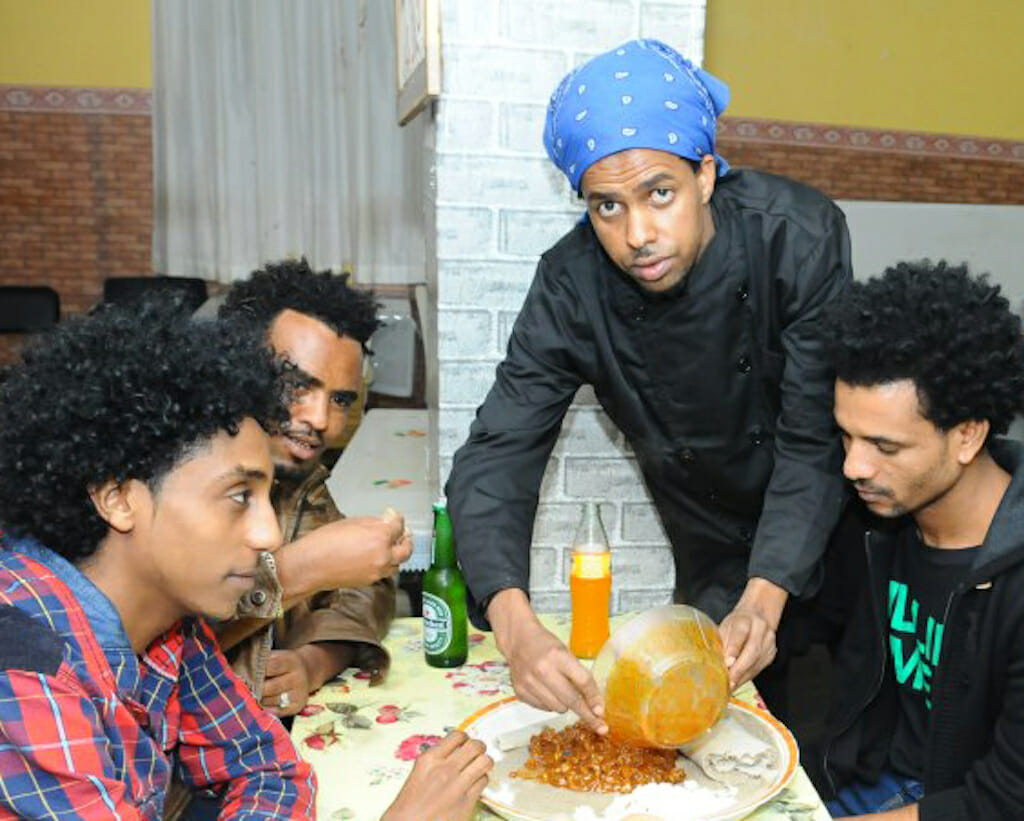Black Lives Don’t Matter in Israel
Benjamin Netanyahu's war on African refugees is worse than imagined—as one Eritrean discovered after human traffickers kidnapped him in Tel Aviv. Ablel Tsegay serving food in his south Tel Aviv restaurant, Dolphin. (Ablel Tsegay / Facebook)
Ablel Tsegay serving food in his south Tel Aviv restaurant, Dolphin. (Ablel Tsegay / Facebook)
Getting caught with marijuana by authorities in country where it is illegal is never a pleasant experience. Even if members of your family back home are able to pull strings and secure your early release, it’s no fun to be behind bars for any length of time, to lose your freedom even temporarily.
But at least one Israeli citizen caught with weed in the Egyptian Sinai Peninsula knows well how easy he got off. Though he was released from jail after just a few days and allowed to return home, his seriously injured cellmate, also from Tel Aviv, was left to languish for a lot longer.
The reason for the disparity in their treatment: Elyasaf is a Jew and a citizen of Israel, who had a stamp in his passport attesting to the fact that he had entered Egypt legally. Ablel, on the other hand, is an Eritrean refugee, who was forced from Israel into Egypt against his will and then tortured by human traffickers.
“Now, you hear this story, and you don’t believe it,” Elyasaf said. “It sounds unbelievable. And really, if I wasn’t there, if I didn’t meet the young man and hear it from him myself, with him there in the Egyptian jail, lying next to me, and I see that it’s true, I wouldn’t believe that something like this is possible. What kind of country do we live in? A man is kidnapped in the middle of the day from downtown Tel Aviv!”
Egyptian border guards caught Elyasaf, a 30-year-old graphic designer, with weed as he was heading home after a few days of vacation at a Red Sea resort. When they locked him up in a Taba prison, he was shocked to learn that a fellow Tel Avivan who spoke perfect Hebrew was stuck in the cell with him.
There, Elyasaf became the first person to hear Ablel’s scandalous story.
After Benjamin Netanyahu’s government built a high-tech fence on the Egyptian border in 2013, the influx of African refugees to Israel ended abruptly. So criminal gangs that had made millions in the preceding years from trafficking and torturing for ransom those refugees now needed an alternate source of income. Bedouin brigands figured that refugees who had managed to make it into Israel could be brazenly kidnapped off the streets of Tel Aviv—and then smuggled back into Egypt.
In the summer of 2013, the Israeli newspaper Haaretz reported that hundreds of Eritreans had gone missing in Israel and that the Netanyahu government couldn’t account for them. Now, however, we can account for at least one: 23-year-old Ablel Tsegay, an enterprising Eritrean refugee who ran a successful restaurant in the Neve Shaanan neighborhood.
On the Jewish fast day of Tisha B’Av in July 2013, Ablel was kidnapped in broad daylight in downtown Tel Aviv, whisked to the border with Egypt and transferred to other captors, who shackled him and other refugees, including children, in a metal shipping container. After months of torture, Ablel managed to escape and reach the Egyptian authorities.

But because he had no passport or paperwork that proved he had been living in Israel, the Egyptians accused him of entering the country illegally and locked him up in jail. Ablel may have rotted away in that cell indefinitely had it not been for his chance meeting with Elyasaf.
In a matter of days after his arrest in Egypt, Elyasaf’s family quietly secured his release. On returning to Israel, he informed Ablel’s sister in Petach Tikvah of the fate that had befallen her brother. Ablel’s family and friends, who had feared that he had been murdered, were happy to hear he was still alive. But Ablel was not allowed to re-enter Israel. Instead, Egypt deported him back to Eritrea and the cruel dictatorship he had orginally fled.
In a three-part series for the Canadian news site Cannabis Culture, I chronicled Elyasaf’s misadventures and the scandal that he inadvertently revealed: that in Israel, in the time of Netanyahu’s war on African refugees, black lives matter very, very little—much less than most of us ever imagined.
Since Ablel was forced out of the country, 20,000 of his fellow refugees have been forced by the Israel government to return to Africa, back to statelessness and suffering. And now Netanyahu is trying to force the final 40,000 asylum-seekers out of the country as well.
In recent months, Israelis from all walks of life—doctors and artists, professors and pilots, students and survivors of the Nazi Holocaust—have expressed opposition to the deportation plan. Up until now, however, no group of Israeli pot smokers has spoken out in solidarity with the refugees.
Admittedly, to take such a step would entail a political cost. In the neighborhoods of south Tel Aviv and the greater Gush Dan area, where most of the refugees live, the vast majority of residents oppose Netanyahu’s expulsion plan. But in the rest of the country—where average Israelis have few opportunities to get to know the refugees—the numbers are reversed.
Stressful as it was, Elyasaf says he doesn’t regret going through his ordeal, because it meant that he could play a small but significant role in Ablel’s eventual liberation. “He really gave me a lot of strength. I owe this man so much,” Elyasaf told me soon after his return to Israel. “If I was able to relay a message from this man, then it will have been worth everything.”
Elyasaf helped his fellow Tel Avivan, a refugee from a totalitarian regime and a torture survivor, to escape indefinite detention and ultimately—after a long, tumultuous journey—to reach safe harbor in Switzerland. The testimony I collected from Elyasaf, embedded below, helped convince the government in Bern to grant Ablel full residency rights there, and today he has a new lease on life.
Below is an interview with Ablel Tsegay, translated from Tigrinya by Hilina Hailu.
Independent journalism is under threat and overshadowed by heavily funded mainstream media.
You can help level the playing field. Become a member.
Your tax-deductible contribution keeps us digging beneath the headlines to give you thought-provoking, investigative reporting and analysis that unearths what's really happening- without compromise.
Give today to support our courageous, independent journalists.






You need to be a supporter to comment.
There are currently no responses to this article.
Be the first to respond.